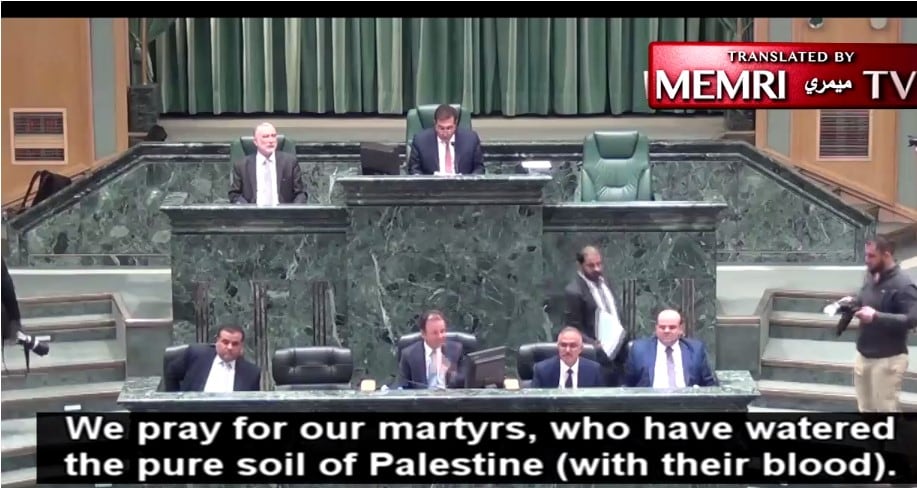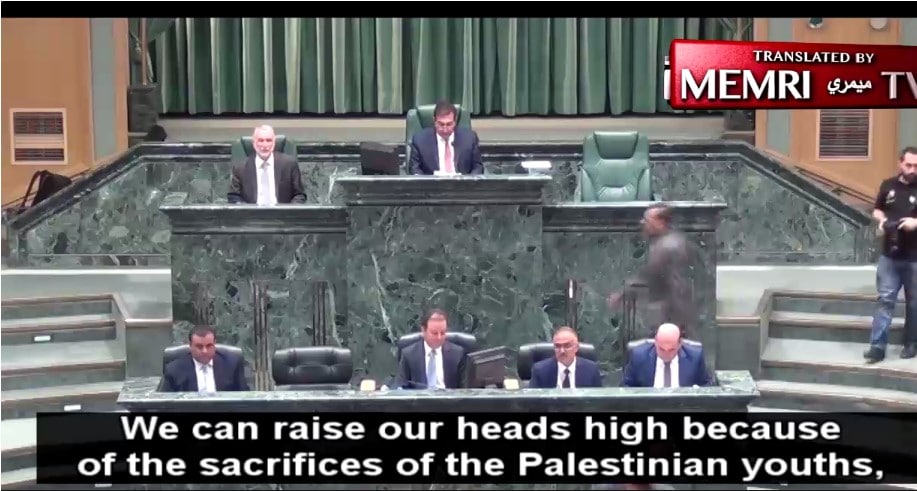The July 14, 2017 shooting attack at the entrance to the Al-Aqsa Mosque compound in the Old City of Jerusalem, carried out by three Israeli Arabs, in which two Israeli policemen were killed, and the subsequent Israeli decision to close the compound provoked numerous reactions in Jordan, which views itself as the custodian of the holy places in Jerusalem.
Jordan's King Abdullah II condemned the attack in a telephone conversation with Israeli Prime Minister Benjamin Netanyahu, expressed opposition to violence in all its forms, and stressed the importance of calming the situation at the Al-Aqsa compound. At the same time, the king criticized Israel's decision to close the compound following the attack. He noted, "Jordan strongly opposes the continuation of the closure of the Al-Aqsa compound," and demanded that Netanyahu "reopen the Al-Aqsa compound to worshippers."[1] Condemnations of the Israeli closure also appeared in statements by Jordan's government spokesman Muhammad Al-Momani,[2] and also in a strongly worded statement published the following day by Jordanian Minister of Endowments Wael Arabiyat in which he warned against "continuing the unprecedented violation of the sanctity of Al-Aqsa Mosque on the pretext of halting the violence and the tension."[3]
In contrast to the king's condemnation, members of the Jordanian parliament praised the three attackers. The July 16 joint parliament-government session opened with a reciting of Surat Al-Fatiha of the Koran in memory of the three who carried out the shooting attack, describing them as "martyrs, who fell [in order] to water [and to continue to water] the pure land of Palestine [with their blood]," and a message to the families of the three, noting that they deserve pride and glory. A parliamentary statement released at the close of the session said: "The serious crimes perpetrated by Israel will continue to justify igniting the fire of vengeance among the younger generation, which is still inheriting the hatred of the occupation from its fathers." During the meeting there were also calls to expel the Israeli ambassador from Amman.[4]

The reciting of Surat Al-Fatiha in memory of the attackers during the Jordanian parliamentary session (source: Al-Ghad, Jordan, July 17, 2017)
To view the clip of the parliamentary session on MEMRI TV, click here or below.


Throughout Jordan there were demonstrations protesting against Israel's closure of the Al-Aqsa compound. In a major march held by the Muslim Brotherhood on July 15, 2017, that set out from the Al-Husseini Mosque in central Amman, participants expressed support for the Palestinian resistance and called on the Palestinians to take revenge on Israeli soldiers. They demanded that the peace treaty with Israel be revoked, that normalization with Israel be stopped, and that the Israeli ambassador be expelled from Amman. During the demonstrations, calls of "death to Israel"[5] were also heard.

Protest demonstration in Amman (source: Al-Sabil, Jordan, July 15, 2017)
Numerous articles in the Jordanian press discussed the attack and its ramifications. The writers condemned Israel and warned against the dangerous precedent set by the closure of the Al-Aqsa compound.[6] Jumana Ghanimat, editor-in-chief of the Al-Ghad daily, even criticized Palestinian President Mahmoud 'Abbas's condemnation of the attack.[7]
Particularly salient in this context is a column by Ahmad Hasan Al-Zoubi from the government daily Al-Rai, who praised the attack and said that it had breathed life into the Palestinian problem, which is normally overshadowed by the Arab world's preoccupation with its internal conflicts.
The following is the translation of Al Zoubi's column.[8]
"The Martyrdom Of The Three Young Men" Made Me "Happy And Proud"
"I was not angered nor was I saddened by the martyrdom of the three young men who carried out the operation at the Al-Aqsa Mosque. On the contrary, I was happy and proud because they have corrected the direction [the compass] of the conflict, roused millions of Muslims from their slumber of oblivion, and they have struck the warning bell. Their blood is more important and precious than the ink on all the [peace] agreements, and the news of their deaths as martyrs received wider coverage than all [the news] about the Arab summits. The Al-Aqsa martyrs are the grains of wheat of the endless resistance. They sacrificed their lives for the Dome [of the Rock]. They will not disappear and will not fade away with time, as every martyr leads to another hundred warriors and in the heart of every warrior are a thousand martyrs, until the land returns to its owners, and no one other than the worshippers and the doves of peace will touch the holy places.
"In the face of the Arab renunciation of the [Palestinian] problem, [which is] the most important of all, and in the midst of the arguments and the struggles, the siege, the accusations, the preoccupation with media battles among the Arabs, and in light of the paralyzing inertia that has afflicted the hands of the [Arab] nation, it was inevitable that an occurrence like the Al-Aqsa attack would take place, and declare in bullets and blood: how hardhearted you are toward Al-Aqsa, how hardhearted you are [when it comes to] your argument, in your insistence on bargaining... in your dispute and forsaking of the land of Palestine. There was a need for an event that would remind [us] of the direction in which the compass of hostility, the compass of occupation, the compass of blood, is pointing. There was no escaping a message written with the aid of the Palestinian steadfastness, on the land of the Mi'raj [Ascension],[9] by means of the fingers that pulled the trigger."
"How Can Your Heart Obey You When You Aim The Rifle... At Your Brother... [And At The Same Time] Extend Your Hand To Those Who Stole Your Land And Your Honor[?]"
"Arab brothers... brothers in religion and in destiny, not one of your problems, and not even the smallest, will be solved as long as the [threat] of the gallows still hangs over the land and the holy places [of Palestine]. The [Palestinian] issue will not be resolved as long as the [Palestinian] people do not tear the occupier's hammer from his hand, publish their just verdict, and reclaim their stolen homeland.
"Oh partners in the Arabic language, oh fellows of the homeland, how can your heart obey you when you aim the rifle's muzzle at your brother's chest [and at the same time] extend your hand to those who stole your land and your honor... Have no concern for us, for death is our daily bread [and] if we do not pray at Al-Aqsa [Mosque], know [at least,] that the rifle prayed there."

From the Al-Ghad daily: Israel as a bird of prey swallowing Al-Aqsa Mosque, July 15, 2017.
[1] Kingabdullah.jo, July 15, 2017.
[2] Al-Ghad (Jordan), July 14, 2017.
[3] Al-Ghad (Jordan), July 15, 2017.
[4] Al-Ghad (Jordan), July 17, 2017.
[5] Al-Sabil (Jordan), Albosala.com, July 15, 2017.
[6] For example, Faiz Al-Faiz, Al-Rai (Jordan), July 16, 2017.
[7] Al-Ghad (Jordan), July 16, 2017.
[8] Al-Ghad (Jordan), July 16, 2017.
[9] The Mi'raj or Ascension to Heaven – according to Muslim tradition, Muhammad ascended to the seven heavens from the area of Al-Aqsa compound.




